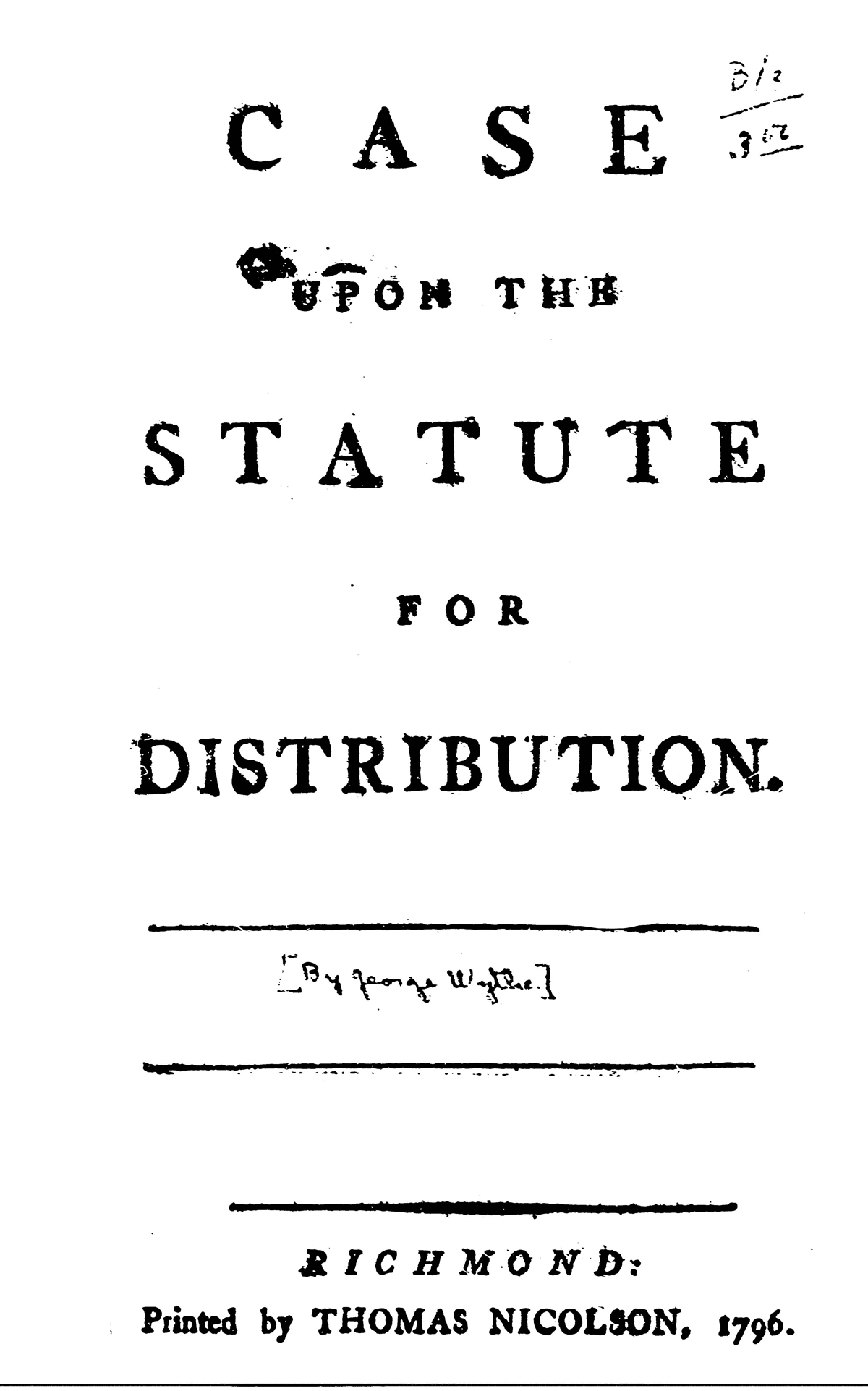Case upon the Statute for Distribution
by George Wythe
| Case upon the Statute for Distribution | ||
|
at the College of William & Mary. |
||
| Author | George Wythe | |
| Published | Richmond, VA: Printed by Thomas Nicolson | |
| Date | 1796 | |
| Language | English | |
| Pages | 38 | |
| Desc. | 8vo (21 cm.) | |
Case upon the Statute for Distribution[1] is an essay by George Wythe, a discourse concerning a 1705 Virginia statute for the distribution of a dead person's property. It was published in pamphlet form in 1796 by Thomas Nicolson of Richmond, Virginia, who had published Wythe's Reports in 1795, and at least seven other supplements for Wythe, in 1796 and after.[2] The essay was included in the second edition of Wythe's Reports, in 1852, as is summed up by the editor, B.B. Minor:
On the words, 'provided that there be no representations admitted among collaterals, after brothers and sisters children,' which are literally transcribed into our statute, english courts have decided that the collateral kindred, whose representatives succede to the shares, to which their parents, if they had been living, would have succeeded, must have been brothers and sisters of the intestate:
So that although B, the surviving brother, and D, the child of C, a deceased brother, would succede to the goods, of A, dying intestate, and childless, &c.
Yet B, the surviving uncle, should succede to all, excluding D, the child of C. a deceased uncle, from succession to a part of the goods of A. in the same circumstances.
So, if 13, and C, bad been nephews of A; or if B, had been the uncle and C. the nephew, who, by the case in 1 Atkyns rep. 454, or in equal degree of kindred to A.
The argument of North, C. J., (in T. Ray. Rep. 496,) in support of these decisions, examined by the Chancellor; who holds that
The children of those next of kindred to the intestate in equal degree, however remote, are not excluded from succession, to the portion to which their stock, if living, would have succeeded.[3]
Evidence for Inclusion in Wythe's Library
Upon his death, a copy of this pamphlet which had belonged to Wythe was bequeathed with his books to Thomas Jefferson. Jefferson had the pamphlet bound into a volume with seven of Wythe's other Chancery decisions which were published as supplements.[4] Subsequently, the volume became part of the collection at the Library of Congress, titled on the spine: Wythe's Reports. Supplement. Virginia. 1796-99.[5] The pamphlet for Case upon the Statute for Distribution has a handwritten notation, "no. 1," on the first page.[6]
The copy at the Library of Congress contains "Several corrections in the text inserted in ink by Wythe."[7]
Title page from Wythe's pamphlet, Case upon the Statute for Distribution (Richmond, VA: Thomas Nicholson, 1796). Copy at the American Antiquarian Society.
See also
- American Bibliography
- Between Fowler and Saunders
- Between Wilkins and Taylor
- Between Yates and Salle
- The Case of Overtons Mill: Prolegomena
- Case upon the Statute for Distribution
- Decisions of Cases in Virginia by the High Court of Chancery with Remarks upon Decrees by the Court of Appeals, Reversing Some of Those Decisions
- Love against Donelson
- Report of the Case between Aylett and Aylett
- Report of the Case between Field and Harrison
- Wythe's Library
References
- ↑ George Wythe, Case upon the Statute for Distribution (Richmond, VA: Thomas Nicolson, 1796).
- ↑ Charles Evans, in his American Bibliography, vol. 11 (1942).
- ↑ George Wythe, Decisions of Cases in Virginia by the High Court of Chancery with Remarks upon Decrees by the Court of Appeals, Reversing Some of Those Decisions, 2nd ed., ed. B.B. Minor (Richmond: J.W. Randolph, 1852), 302.
- ↑ "Six tracts originally bound together in calf for Jefferson by Milligan on June 30, 1807 (cost $1.00). Rebound in Buckram for the Library of Congress." E. Millicent Sowerby, comp., Catalogue of the Library of Thomas Jefferson (Washington, D.C.: Library of Congress, 1953), 2:208[1760].
- ↑ Library of Congress catalog record. This volume contains pamphlets for: Case upon the Statute for Distribution (1796); Field v. Harrison (1794); Fowler v. Saunders and Goodall v. Bullock (1798, together in the same pamphlet); Wilkins v. Taylor (1799); Yates v. Salle (1792); and Love v. Donelson (1801). See also: Aylett v. Aylett (1793), and Overton v. Ross (1803).
- ↑ For the pamphlet numerations, see WorldCat.
- ↑ Sowerby, 2:208.
External links
- Library of Congress catalog record.
- Sowerby Catalogue, at HathiTurst.

